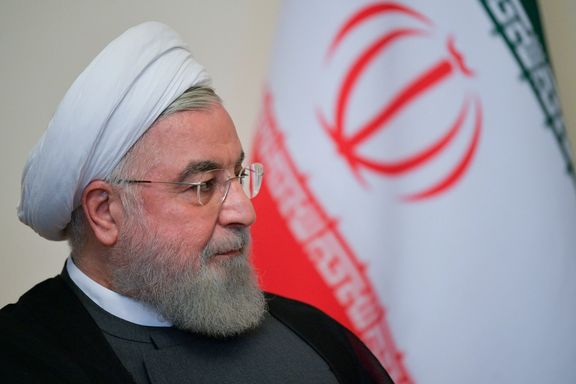Ex-Iranian President Says Government's Top Priority Must Be Lifting Sanctions

Former Iranian President Hassan Rouhani has stated that the most crucial task for the upcoming president will be to help lift sanctions.

Former Iranian President Hassan Rouhani has stated that the most crucial task for the upcoming president will be to help lift sanctions.
“It is clear that the task of lifting sanctions is not a simple one, but it can be achieved with a balanced approach that neither leans towards Eastern nor Western policy,” Rouhani said in a statement published on Wednesday. “And with a global collaboration strategy and the utilization of competent, dedicated, and fearless personnel.”
Rouhani advocated for a foreign policy stance transcending the dichotomy of East versus West, contrasting with Khamenei's prominent "Looking East" strategy, underpinning the hardliners' push for a "revolutionary economy."
Major decisions concerning Iran’s foreign policy originate from Khamenei's headquarters.
“At present, the primary concern of the populace revolves around the soaring cost of living and the stagnant employment growth witnessed in recent years, as reflected in the escalating ‘Misery Index,’” Rouhani said, in what seems like a direct message to Khamenei.
The Misery Index, which measures combined unemployment and inflation rates, consistently ranks Iran among the top countries in the region with high misery scores.
The foreign policy decisions of the Islamic Republic have significantly worsened the economic situation. Sanctions, imposed due to Iran's ongoing nuclear weapons program and support for terrorist groups, have intensified economic strain. However, the Supreme Leader and his loyalists have been reticent in acknowledging economic hardships.
There will be a snap election on June 28 following the sudden death of President Ebrahim Raisi in a helicopter crash last month with the six handpicked presidential candidates having begun airing recorded interviews.
None have addressed foreign policy except for hardliner former nuclear negotiator Saeed Jalili, who explicitly stated his opposition to the nuclear talks and deal.
Khamenei demonstrated flexibility during Rouhani's tenure by accepting the Joint Comprehensive Plan of Action (JCPOA), signed in 2015 between China, France, Russia, the United Kingdom, the United States, and Germany. The agreement was considered a landmark achievement in curbing Iran's nuclear program. Then-President Donald Trump subsequently withdrew the United States from the deal in 2018, citing its purported ineffectiveness in combating Iran's missile program and regional influence.
“Some officials made us wait for three or four countries and made Iranians suffer for years. They followed a path that yielded no results”, the ultraconservative said on Tuesday.
Praising Raisi's hardline administration, Jalili stated, "The same officials claimed that without the deal [JCPOA], the country’s economy would collapse. However, over the past three years, we have managed to sustain a strong economy and export to various countries."
This is while over the past three years, numerous observers, ranging from hardliners to 'reformists,' have also blamed the current situation on the failings of late President Ebrahim Raisi's economic team. Despite this, Raisi had adhered to Khamenei’s policy of strengthening ties with Russia and China and reducing ties with the West.
Meanwhile, Iran remains dependent on its allies, China and Russia. Russia’s suspending a new comprehensive cooperation agreement has put Iran’s dependency on the world stage. Some analysts, including former Iranian diplomat Hossein Alizadeh, believe Russia is leveraging Iran's global isolation to extract more favorable terms akin to the 25-year deal with China.
Also, tensions persist as both Russia and China support the territorial claims of Arab Persian Gulf countries against Iran such as in the United Arab Emirates’ claim over three disputed islands.